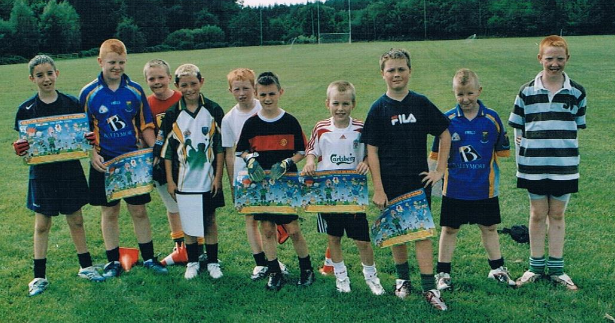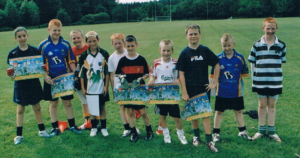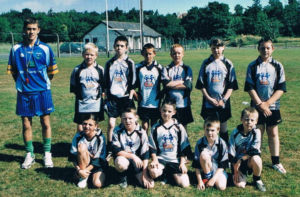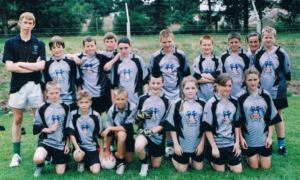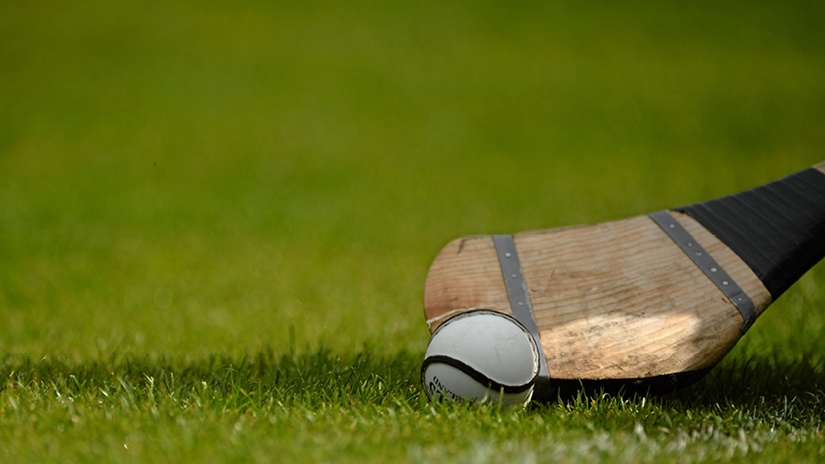As we head into the Easter period and hopefully a return to pitch side coaching in our clubs. The extra hour will be starting from this Sunday as the Summer time will now be official and the long bright evenings is something we all look forward to. The question I put to everybody have we taken this enforced time out to upskill and improve our knowledge and layout for our planned coaching sessions. Help and support is always at hand through our GDA’s and GPO’s and all clubs are asked to take advantage of this coaching support. Now is a good time to check what equipment is available by carrying out on inventory and then replenishing stock and adding new coaching aids to support the return to play.
COACHING STYLES
Your coaching style will determine how you prepare for coaching sessions, how you decide what skills and strategies to teach, what methods you choose to discipline players and what role you allow players in any decision making.
Style 1. Direct/Command/Authoritarian
Overview: The coach is in charge and is the exclusive decision maker
Explanation: The coach gives a demonstration of the expected performance, emphasizing and explaining specific points. The Coach feels it is their role to tell the player what to do. This style is effective if winning is the main goal of the Coach.
How players are affected: This style can lead to players being motivated to play through fear of the Coach. This approach does not inspire players to think from themselves.
Style 2. Democratic/Cooperative
Overview: The coach shares the decision making with the players.
Explanation: The coach will guide performers towards selecting and achieving their goals. In this style the coach provides leadership in the form of positive guidance. Coaching emphasis of success is on effort and improvement rather than success through winning. Players recognize the coach as the leader who guides them towards their goals.
How players are affected: A democratic approach is a good way to maximise the level of interest from players. Coaches are empowering their players to take accountability for their actions. Playing a key role in the decision-making process, players grow their decision-making skills
Style 3. Facilitator
Overview: The coach harnesses an environment for team/individual development
Explanation: The coach facilitates the team without very much instruction, instead trying to create a positive experience through teamwork, challenges and foster a love of the game
How players are affected: Players are able to participate and develop as the facilitative coach view themselves as being there to allow the players to play in a fair, team centred environment. More common at nursery/youth, but coach tends to lean into a more democratic approach further on.
Style 4. Submissive/Baby-Sitter/Lassiez Faire
Overview: The Coach makes as few decisions as possible
Explanation: The coach gives little instruction and provides minimal guidance in organizing activities. coach is concerned with creating an environment where the players can enjoy the freedom to learn new skills and ideas off their own back. For this coaching style, trust is key. Handing over all this responsibility to players could backfire if certain individuals aren’t able to motivate themselves to continually improve without instruction
How players are affected: For coaches this can go 2 ways: Creating a fun and light working environment for all can breed a bond between all the squad. Tipping the balance too far in favour of freedom can lead to a collection of unmotivated players and of players who don’t develop or improve
GAME SENSE WHAT IS GAME SENSE?
Game Sense is an approach to coaching which involves the use of games to develop an understanding of tactics and game concepts, while enabling the performance of skills in a realistic environment. Game Sense makes a game the focus of a practice session rather than technique. It challenges the players to think about what they are actually doing and why. The coach becomes a facilitator, setting tasks to be solved and creating situations where players take on the responsibility of finding solutions for themselves.
Why use Game Sense?
Traditionally, we have taught skills to young players in isolation, and have not always considered the tactical components of the skill (knowing when and where to actually use the skill or what changes need to be made to the skill during the game to make it effective). Game Sense coaching focuses on the performance of skills in game situations and allows players to develop tactical and strategic thinking, decision making, problem solving through tactical awareness and understanding. While there is an important place for technical coaching and skill development, the Game Sense method encourages players to use their basic skills as well as develop strategies or tactics themselves.
How to use Game Sense?
Game sense involves the principle of moving from simple challenges in games to progressively more complex ones. This progression can involve the movement from a relatively structured environment to a more open one. For example: FEW RULES MANY RULES ONE OPPONENT MORE THAN ONE OPPONENT ONE TEAM MATE MORE THAN ONE TEAM MATE.
TIPS FOR TEAM TALKS
It’s always difficult for coaches to place a desired timeframe on the amount of information that should be communicated to players, before during and after a game. It is supported and acknowledged by many coaches that the KISS principle be adapted (Keep it Simple Sport) Communication should be very specific, concise and clearly communicated to both the team and individuals within the team. Team talks should be pre planned and written down in your coaches’ diary.
Inspirational
Build confidence, be prepared, Motivation
Communication
Verbal/Non Verbal, Body Language, choose your tone carefully, have your positioning correct when gaining attention so everybody can hear and see you. Stay calm and positive and avoid any emotional talk, derogatory or sarcastic remarks, ensure players are aware of their positions on the field.
Message
Keep it brief and simple, repeat key points, reinforce plans and tactics that have being practiced
Highlight areas for improvement, question and praise the players, provide brief info about the opposition.
Summary Final reminders
Listen to the Referee and play the whistle, highlight discipline and respect, have fun & enjoy the game.
TIPS & HINTS FOR BETTER COACHING SESSIONS
Some tips and hints to help make your coaching session more structure and organised
1.Provide the greatest possible participation for all players/Keep the session moving no standing around. 2. Little talk and plenty of practice, keep players active & use your voice wisely to assert yourself during the session. 3 Have the session well planned in advance and written into your coach’s diary. 4. Practice double sided left & right 5. Have enough equipment available to conduct your session. 6. All sessions should be fun and enjoyable for all players. 7. Vary each training session e.g. warm up, skills and games activities. 8. All groups should have a minimum 3/4 players to allow for maximum participation and more ball contacts. 9. Ensure you have discipline in your session e.g. good manners & no foul language. 10. Praise and encourage good play while correcting mistakes is key to learning. 11. Use of whistle is very important to start & finish an activity. 12. Coaches should arrive 15/20 minutes before the session commences to set up activities. 13. Never criticise or embarrass a player for making a mistake. 14. Keep a check on the time as you move from one activity to another so you complete the session in the recommended time frame. 15. A Coach should always wear club leisure gear during practice & games. 16. Separate active or giddy players where necessary to avoid distraction. 17. Don’t allow players to play/juggle with the ball while a coach is speaking. 18. Coaches should always emphasis the key teaching learning points of the skill. 19. Name and describe the skill and when & where it is used during a game. 20. When coaching the skills, coach the playing rules associated with that skill. 21. Spot & fix the skill by providing positive feedback to the players. 22. Involve the players in the session by collecting and setting out cones for activities. 23. Make sure players wear the proper equipment e.g. gumshields/helmets. 24. When coaching involve all coaches to play their part in the activities session. 25. Coaches should be familiar with the how to coach skills & the STEPPER model to alter any game, activity and rules. 26. Encourage players to play by the rules and adhere to the Give Rest Get respect initiative. 27. Give out the bibs at the start of the session to avoid disruption of activities. 28. Bring players together at the end of the session to summarise and reinforce Key points.
WHAT DO PLAYERS WANT FROM A COACHING SESSION?
To be inspired, to have fun, plenty of variety in the activities, to be respected and treated equally, to develop values and beliefs, opportunity to play in different positions, that the session is organised and well planned, the session need to be encouraging, challenging with no standing around for long periods. Good positive feedback from the coach by reflecting on their performances, practicing activities that are age appropriate.
WHAT DO PLAYERS WANT TO HEAR FROM COACHES DURING A SESSION OR GAME?
Keep up the good work, don’t give up, you played fantastic, try your best, that was incredible, great team performance, I like how you did that, don’t worry about making a mistake, believe in yourself, do it again and again, that was great to watch, great skill, awesome support play, I’m proud of you, great score, fantastic block, that was an incredible pass.
HOLDING A PARENTS MEETING FOR A SPECIFIC AGE GROUP
To effectively manage a parent’s information meeting before the year commences.
Use a power point if possible it present and direct the meeting. Below is a sample agenda of some of the topics and considerations coaches can use to presenting to a group of parents. Start with a welcome and your management team Coaching Philosophy, introduce your management team/coaches, Outline the coaching & fixtures programme, Highlight what the players need in terms of equipment/gear, emphasis behaviour/discipline code, Explain how you are going to communicate with parents throughout the year, how you manage playing time, explain how the club deals with injuries, Highlight the important role parents play in encouraging their son/daughter, explain how to register and complete the membership form, explain how important teamwork and commitment is to the group, Set your Goals & Objectives for the year, describe the link between team of different age groups and players moving up and down, outline how players are transported to games and the polices surrounding this, Highlight how important time management is in relation to being organised, personal belongings be responsible, sponsorship/fundraising, parents question and conclusion /thank you.
15 Coach Profile Questions
Name: Ciarán McGuirl
Club: Newtown GAA
- Would you change any of the GAA Playing Rules?
I would change the offensive mark to be only balls caught inside the 21
- Why did you get involved in coaching?
I enjoy seeing players develop, from those in the Nursery and Go Games right up to Senior level, you never stop learning.
- What is the most rewarding element of being a coach?
The enjoyment that I get out of it as well as seeing your team benefit from your coaching.
- What advice would you give to young players?
Master the basics, both feet and both hands. A player that can kick, solo and hand pass off both feet is invaluable to any coach.
- What resources do you use to assist you in your role?
I listen to podcasts on coaching as well as following lots of very progressive thinking coaches on social media. It’s amazing the little drills and games you can pick up from different coaches.
- What does success look like to you?
Success to me at juvenile level is having all players looking forward to going to each training session, player retention to me is a key barometer on how good your coaching is. At a more senior level, success is building a good team culture where players are happy to be part of but also drive each other towards a common goal.
- What do you see as your three main responsibilities as a coach?
1) Creating a safe and enjoyable place for players to learn, 2) Ensuring you don’t lose the FUN from coaching 3) developing not only the player but the person
- How important is winning to you? why?
At Juvenile level up to u15’s I don’t see it as that important. A coach who concentrates on winning at all costs will lose players in the long run, a coach who ensures participation as a key focus will have a large squad to work with each year. Only 1 team can win a championship so are all other teams a failure- I don’t think so, progress from one year to the next is as important.
- You have 10 footballs & 10 cones in your coaching kit bag. You are in charge of 30 players how would you conduct training to maximise all equipment & player involvement? I would start off by grouping the players in 3’s and asking them to work together on the basic skills of the game to ensure they all get as many touches as possible. You could then make a number of small pitches and play 3v3 or 5v5 again to maximise the amount of touches each player receives. It’s also key to ensure that you add in some basic conditions to the game like one hop one solo, fist pass only, kick pass only etc. Ensure that you include a fun game at youth level – you can ask the kids if they have any they like playing.
- What part of training or games do you dislike the most?
There’s nothing I dislike really as I find you can learn from everything you encounter and improve as a coach!
- What does a normal coaching week look like for you and the team?
For the Senior team – Training Tuesday, Thursday, match at the weekend, planning each session the day before and contact with the players throughout the week. Watching footage of the games and editing clips to share with the team.
- Why is planning your coaching sessions so important?
Having a plan first of all shows that you have put thought in to the session, players will love this. It means you are more prepared and better equipped to deal with any issues that might arise. As a coach though you need to be flexible, the number of payers you were expecting might be lower – games/drills might need to change, weather could mean a need to change what you were going to do, availability of the training pitch, being able to think quickly on your feet is a massive bonus.
- Why is feedback so important to player development?
It’s like anything in life- you can learn from your mistakes but if you do not realise you are making them you will continue to do so. Feedback is essential but it also need to be approached correctly. Try and not phrase it that you are doing something wrong but more that if they change how they are doing it they can improve the skill.
- If one of your players are constantly overplaying the ball how do you get the player to correct this? You can include conditions on the games in training so that each player must play the ball, 2 plays of the ball only and you must pass. Telling the player that he will benefit greatly from improving the players around him will encourage him to help develop his teammates.
- Explain how you have kept up to date with coaching methodologies and tactics?
Again I follow a lot of good coaches in social media, attend lots of webinars and try and upskill by doing coaching courses.
By wicklowpro Wed 24th Mar
